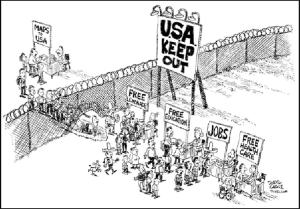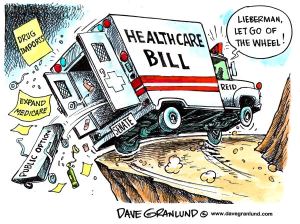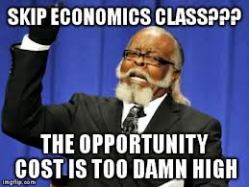As my final day as a high school student comes to an end, I cannot help but reminisce about the great many memories from economics class which have been so big a part of my life for the past two years. With every day spent, another lesson was learned, and with every blog post created, another idea expressed. While I am sad to see my high school career come to an end, I eagerly await what the future brings with it. No matter where I end up, I know that I will carry with myself the knowledge gained sitting in a classroom listening to the calming sound of an expo marker gliding across a whiteboard, leaving behind it the demand and supply curves which have to say the least, been engrained within my soul. With that, I believe there is no better way to end my year as a writer for Econ Diaries than to write a final blog post, reaching on a breadth of current economic issues, where I discuss the facts and give my opinions about them, and possible solutions, so here goes.
IMMIGRATION

Issues:
Immigration (uncontrolled and illegal) is one of the most pressing issues faced by our country today. The United States, a “promised land” for those seeking a better life than that which can be found within their own countries, has for years now been burdened by an influx of illegal immigration. Illegal immigrants cause an unnecessary drain on the US economy; they take jobs from hardworking Americans as employers seek to cut costs by hiring workers who are wiling to work below the minimum wage.
Not only is there an issue with immigrants taking jobs for lower wages, thus increasing unemployment, but there is also a major issue with how the government treats these illegal immigrants. No longer, it seems, is deportation the immediate response to illegal immigration, now, many people, both immigrants and Americans, are speaking out for amnesty. Hundreds of thousands of people a year, manage to successfully cross into the United States through legal means, and now, people are speaking out in support of giving citizenship to those who broke our laws by entering illegally in the first place. Not only is it a moral issue about whether or not to give citizenship to those who are here illegally, it is an economic issue as well. Those who enter illegally, more often than not, end up on social welfare systems, financed by the US taxpayer. The fact is, the more illegal immigration into the US is allowed, the higher the tax rate will be for employed US citizens.
Solution:
What better solution to the immigration issue exists then to become more strict when it comes to immigration laws. There should be no question that when a person is found to be here illegally, he/she should be deported, no questions asked. If a man comes into the country illegally, he understands that deportation is the penalty. The fact that deportation is frowned upon by many, is ridiculous; laws are laws, and are in place for a reason. The more lenient our nation becomes on the issue of immigration, the more jobs our citizens will lose to people who come here illegally and are undeserving of the work they find. Not only should those found to be here illegally be punished, but their employers should face more strict consequences as well, to discourage further employment of undocumented persons. If those who seek to come here illegally find that it will be impossible to find work, they will be less likely to attempt entry into our borders.
HEALTHCARE

Issues:
Healthcare has been at the forefront of news for months now. The reason? The Affordable Care Act, ACA, most often referred to as “Obama Care.” This an aging population, a decline in the labor force participation rate, as well as the increase in the discouraged worker effect caused by the recession, the money paid into the healthcare system has seen a notable decline in recent years. Not only has funding gone down, costs have gone up. With the enactment of the ACA came the disastrous overhaul of the healthcare system. The president’s dreams of a more universal healthcare system gave rise to HealthCare.gov, an over half billion dollar website which was supposed to simplify the processes for applying for healthcare, which ended up seeing fewer than expected signups, months upon months of delays, and millions of lines of code which most experts deem excessive. Today, while the healthcare.gov website is finally operational, the issue is far from resolved; many people are still without insurance, money paid into the healthcare system does not equal money paid out, and a large portion of the nation is calling for either the repeal or relaunch (with more clearly laid out plan) of Obama’s legacy legislation.
Solution:
The solution to the nation’s failing healthcare system is not as simple as the solution for immigration reform. I personally believe, and so do most Americans, that healthcare should be accessible to all members of our society. However, I believe, as polls show many Americans do as well, that a universal system of healthcare is not the best approach for our nation. Not only is a required government run healthcare system seriously stretching the elastic clause of the constitution to its limits, but it also doesn’t work for a nation like the United States of America. For one, we’re too populous to control everyone from a central government program, not to mention the fact that our aging populous means higher and higher costs for the working class, should current population patterns continue. The solution is, I believe, to revert back to the system which was in place before the enactment of the ACA, and to fix the flaws within the system, which is easier than trying to make a new untested system work on a rushed timeline. While the previous system had its flaws, they were more easily correctable than the flaws that have arisen with the new healthcare system.
EDUCATION

Issues:
Having myself just finished my last day of high school, I can personally attest to fact that the US education system is severely flawed. Although the US federal government spends over 11,000 dollars on elementary through high school students, on average, it is evident that we clearly do not preform at the level of our counterparts in many other nations. Being Finnish myself, and frequently visiting Finland, I know first hand what a well run education system looks like, and what we have in no way resembles this. While the government spends hundreds of billions of dollars a year on education, the fact of the matter is, most of that money goes to waste. With teachers unions ruling the public education industry with an iron fist, it is no wonder that our students are not preforming as well as our european counterparts. Unions make it nearly impossible to fire bad teachers, thus forcing students to deal with sub-par instructors and learn less and less every year. It is no wonder that so many parents are moving their students from public schools to private and charter schools, where a poorly preforming teacher can be terminated more easily, thus ensuring a higher average level of educational instruction. A nation is defined by its youth, and as long as our youth is not educated at the highest possible level, our society will continue its decline among the nations of the world.
Solution:
I believe the solution to this flawed system is quite simple. If the money which is currently used to pay for these poorly preforming teachers were to be used instead for mandatory performance reviews, which each educator would have to pass to be allowed to continue teaching, then the power of teachers unions to keep in place sub-par teachers would be lessened, educators would have to start performing, and ensuring their students do as well, and the end result would be a higher quality education for all our nation’s youth. With a simple yearly performance review, it could easily be seen which teachers should continue to teach, and which ones simply don’t make the cut. I’m personally tired of going to Europe where I’m seen as the “dumb” American student and have to prove myself to everyone I meet. Only with a strong educational foundation can the US continue to provide the planet with the most intellectual minds of our generation. Education is the key to continued prosperity.
Thank you to all our loyal readers,
I’ll be spending this summer on a small island off the coast of Finland. There I will spend my days chopping wood with my trusty Fiskars ax, swimming and boating with my cousins, and waiting with great anticipation for my college days to begin. This will be my last post.
-Andre







